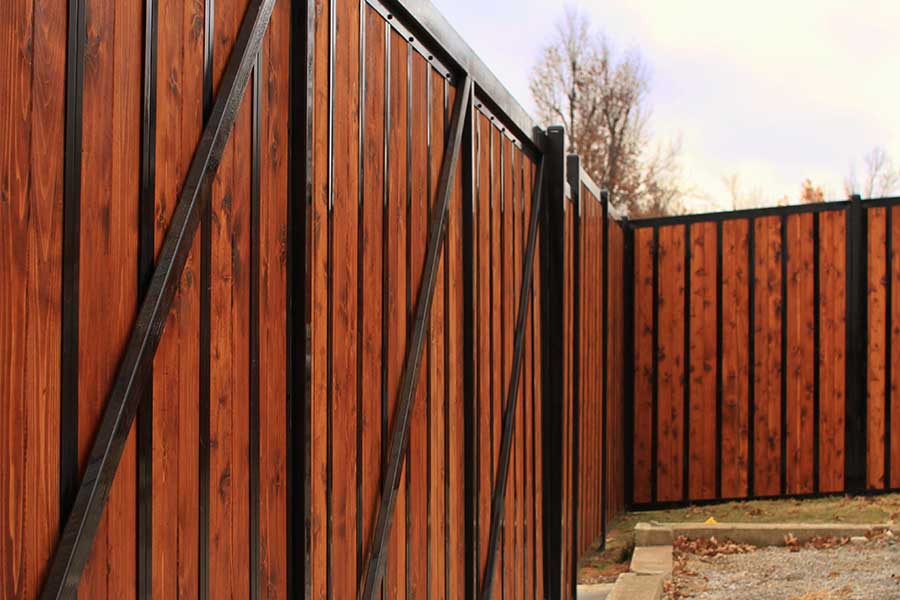All Categories
Featured
What Kinds of Fence Materials Are Offered for Residential and Commercial Projects?

When planning to set up a fence, picking the best material is critical for meeting the visual, useful, and financial needs of your building. Whether for industrial or domestic usage, contemporary secure fencing alternatives use a selection of selections to match particular requirements. Right here's an extensive take a look at one of the most usual fence materials available today.
- Timber Fencing. Timber is a classic option for homeowners looking for beauty and flexibility. It works well for personal privacy fencings, ornamental designs, and border marking.
Key Benefits of Wood Fencing:
Visual Adaptability: Can be crafted right into various designs, consisting of board-on-board, picket, and lattice styles. Affordable: Offers price for numerous tasks, particularly smaller sized household ones. Adjustable: Easily repainted or tarnished to match a home's outside. Drawbacks: Requires routine upkeep, such as sealing and staining, to secure against weathering and parasites.
- Vinyl Secure fencing. Plastic fencing has actually grown in popularity as a result of its sleek appearance and very little upkeep demands. It's a wonderful alternative for both business and residential rooms.
Advantages:
Lasting and resilient: Vinyl resists weather damage, bugs, and fading. Easy Upkeep: A fast wash with soap and water maintains it looking pristine. Stylish Options: Is available in multiple shades and appearances, some simulating all-natural wood. Factors to consider: The first price is greater, yet the long-term financial savings on upkeep can make it a wise investment.
- Chain-Link Secure fencing. Chain-link secure fencing is a functional service for protecting huge areas, usually made use of in business, commercial, and leisure properties.
Advantages:
Cost: One of the most affordable secure fencing choices. Resilience: Takes on damage, even in challenging environments. Exposure: Gives a clear view while keeping protection. Downsides: Minimal visual appeal and privacy unless integrated with slats or foliage.
- Aluminum Secure fencing. Light weight aluminum uses an innovative appearance without compromising on durability. It's specifically preferred for ornamental or security objectives.
Secret Includes:
Rust-Free: Perfect for moist climates or swimming pool rooms. Reduced Maintenance: Calls for marginal upkeep contrasted to iron or timber. Stylish Appearance: Commonly used to resemble functioned iron without the substantial price tag. Factors to consider: Not as solid as steel, making it less suitable for high-security requirements.
- Wrought Iron Fence. Recognized for its ageless elegance and durability, functioned iron is a favored for upscale buildings.

Advantages:
Toughness and Safety And Security: Difficult to break or bend, making it suitable for high-security applications. Adjustable Layouts: Can be shaped into complex patterns for a distinct appearance. Long life: With appropriate upkeep, wrought iron can last for decades. Disadvantages: Needs routine upkeep to stop rust and is among the more pricey secure fencing options.
- Composite Secure fencing. Composite fences combine wood fibers and plastic for a durable, eco-friendly option.
Benefits:
Environmentally Friendly: Usually made from recycled materials. Reduced Maintenance: Resistant to rot, bugs, and warping. Natural Appearance: Simulates the look of timber without the maintenance. Disadvantages: Greater in advance expense contrasted to standard timber fence.
- Bamboo Fence. Bamboo is a trendy and lasting selection, specifically for properties seeking an all-natural visual.
Advantages:
Eco-Friendly: Bamboo is naturally degradable and eco-friendly. Unique Look: Includes a tropical or Zen-inspired touch. Cost-Effective: Often less costly than woods. Downsides: Much less resilient in extreme climates or versus extended exposure to moisture.
- Steel Fencing. Steel fencing supplies unparalleled toughness, making it a go-to choice for commercial and business needs.
Features:
Sturdy Toughness: Deals with substantial impacts and climate difficulties. Personalized Surfaces: Powder covering enhances its appearance and longevity. Safety and security: Suitable for locations needing enhanced defense. Considerations: Higher cost and weight make it less suitable for small-scale jobs.
- Masonry or Stone Secure Fencing. For properties seeking a extremely sturdy and irreversible choice, masonry or rock fencing is a costs choice.
Advantages:
Ultimate Toughness: Withstands extreme climate and lasts for decades. Soundproofing: Blocks sound, making it perfect for metropolitan locations. High-end Aesthetic: Supplies an upscale look that enhances premium buildings. Downsides: High installment prices and minimal versatility in design adjustments.
How to Pick the Right Product. When selecting a fencing material, think about the following factors:
Function: Do you need security, privacy, or ornamental allure? Budget: Some products, like timber and chain-link, are cost-effective, while functioned iron and stone come at a costs. Upkeep: Materials like vinyl and aluminum are simpler to preserve, while timber and functioned iron need routine treatment. Climate: Some materials, such as bamboo or without treatment wood, are less ideal for rough weather condition conditions. Final thought. Fencing products today supply a vast range of options to fit various spending plans, features, and styles. Whether you focus on durability, visual appeals, or eco-friendliness, there's a material that will certainly fit your needs. By functioning with an expert secure fencing service provider, you can check out these options in-depth and make certain a perfect installment for your domestic or industrial project.
Latest Posts
Uncover the Premier Auto Repair Coupons in Montclare, Chicago
Published May 25, 25
1 min read
Check Out Premier Auto Repair Care offered by Montclare Auto Repair – Drive with Confidence
Published May 23, 25
1 min read
Enhance Your Building with Overhead Door Equipment
Published May 22, 25
1 min read
More
Latest Posts
Uncover the Premier Auto Repair Coupons in Montclare, Chicago
Published May 25, 25
1 min read
Check Out Premier Auto Repair Care offered by Montclare Auto Repair – Drive with Confidence
Published May 23, 25
1 min read
Enhance Your Building with Overhead Door Equipment
Published May 22, 25
1 min read